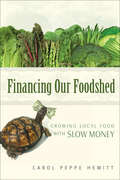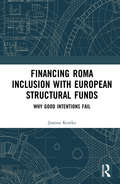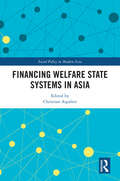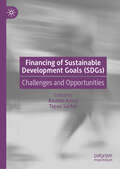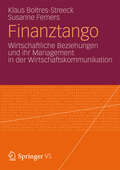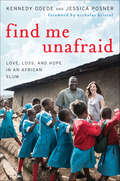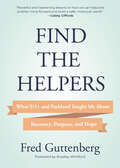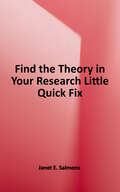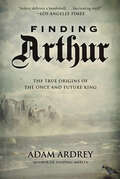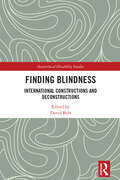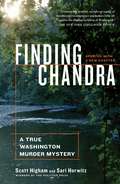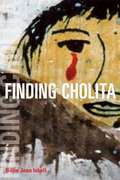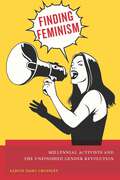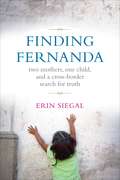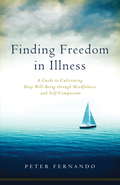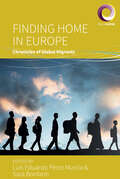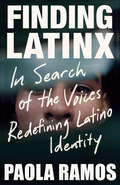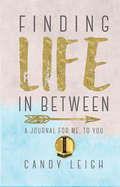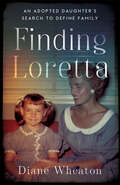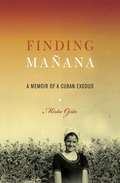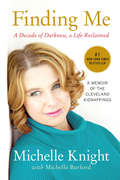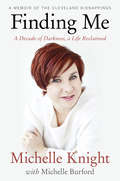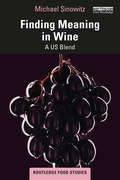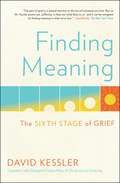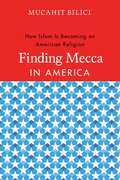- Table View
- List View
Financing Our Foodshed: Growing Local Food with Slow Money
by Carol Peppe Hewitt“[Hewitt] paints an engaging portrait of a community learning how to take care of its own, and offers inspiration for others looking to do the same.” —Amy Cortese, author of LocavestingIn towns and cities across North America, a quiet revolution is underway. Fed up with sending their money off to make a fast buck in faraway markets, people are putting their money to work where they live, in markets they trust and understand—starting with food.Financing Our Foodshed is a collection of real-life stories of these Slow Money pioneers and the local food entrepreneurs—sustainable farmers, bakers, restaurateurs, and more—they have chosen to support.Fueled by their desire to do more than just eat local food, lenders of “nurture capital” are making low-interest, peer-to-peer loans to the people who produce, process, distribute and sell local food. Meet these passionate food entrepreneurs like:Abi, talented artist-turned-baker, who borrowed the funds to start a gluten-free bakeryAngelina, owner of a Greek local foods restaurant, who refinanced exorbitant credit card debt incurred by renovationsChatham Marketplace, a much-loved grocery co-op whose monthly loan payments were reduced by a third, thanks to an ambitious collaboration between 16 investorsFinancing Our Foodshed tells the compelling stories of ordinary people doing something extraordinary, and will appeal to anyone who understands the critical importance of sustainably grown local food and resilient local economies, and wants a blueprint to get us there.“For anyone seriously interested in boosting his or her community’s economy—including politicians, policymakers, financiers, businesspeople, and activists—this book is essential reading.” —Michael H. Shuman, author of Put Your Money Where Your Life Is
Financing Roma Inclusion with European Structural Funds: Why Good Intentions Fail
by Joanna KostkaThis book provides an analysis of the highly politicized field of Roma inclusion and addresses the controversies surrounding the effectiveness of funding initiatives derived from European Cohesion Policy. It confronts the widely held notion that European financial transfers (Structural Funds) are highly suitable instruments to address the systemic causes of poverty and to facilitate changes towards substantive equality for Europe’s largest ethnic minority. Shedding critical light on the Structural Funds programme, it offers an innovative approach to thinking about the value of European funding schemes and efficacy of national Roma inclusion strategies. Multidisciplinary in approach, it draws on rich interview material and literature from fields including policy implementation, new public governance, equality studies, and political representation, Financing Roma Inclusion with European Structural Funds examines the implementation of European funding in Spain and Slovakia, two countries with contrasting policy outputs, and offers a nuanced picture of the way European Cohesion Policy interacts with intricacies of domestic policy-making. It thus sheds light on the key challenges facing Roma inclusion strategies in contemporary Europe and will be of interest for for scholars interested in European studies, equality policy, new public governance and minority studies.
Financing Welfare State Systems in Asia (Social Policy in Modern Asia)
by Christian AspalterThis book identifies the main causes of welfare state system extension, as well as the differences in welfare state system design and their consequences for human behaviour and future financial stability of the systems in place in different parts of Asia. Providing ten in-depth country case-studies from across the region, including India, Thailand, China, Hong Kong, Macao, Taiwan, and South Korea, as well as Russia, Turkey and Saudi Arabia, the book focuses on the situation of welfare state system development and its financing in some of the largest countries on earth. It addresses previously neglected areas for investigation, such as the causal reasons for welfare state system extension (not only in Asia but in general), the types of social security systems and their incentive systems in place, and the way they chiefly determine behaviour—and thus determine the resulting social security needs. This book will be of interest to all scholars and students of social policy, public policy, political science, sociology, finance and economics, development studies and Asian studies more broadly.
Financing of Sustainable Development Goals (SDGs): Challenges and Opportunities
by Tapan Sarker Rashmi AroraThe economic and social impact of Covid-19 pandemic both on developing and developed countries has been significant. In addition to the impact of the pandemic, the current Ukraine war has also led to severe supply chain disruptions leading to a sharp increase in food and commodity prices globally. Due to a combination of external shocks and the impact of the pandemic, global economic growth slowed down and is projected to continue to decline. The above factors have led to a sharp increase in government expenditure constraining both developed and developing countries' fiscal capacity. This has further implications for the achievement of SDGs, especially for low-income countries. The challenge for developing countries in the current scenario is to mobilize adequate resources both from domestic and international sources, not just for the achievement of SDGs as such, but also to sustain the livelihoods, health, and welfare of people. This book aims to examine some of these issues in the context of developing countries.
Finanztango
by Klaus Boltres-Streeck Susanne FemersWirtschaftskommunikation ist eine vielfältige Managementaufgabe. Gegenstände der Steuerung sind zweifelsohne die Inhalte und Instrumente der Kommunikation. Management in der Wirtschaftskommunikation bedeutet aber mehr: Vielfältige Beziehungen der Akteure im Kommunikationsprozess sind von Kommunikationsmanagern aktiv und bewusst zu gestalten. Im "Finanztango" dieser Wirtschaftsbeziehungen sind daher für zielorientierte Kommunikation die Parkettbeschaffenheit zu prüfen, die gemeinsamen Schrittfolgen genau zu planen und mögliche Hindernisse abzuschätzen. Dieses Buch bündelt und systematisiert Wissen zum Beziehungsmanagement, damit die Pflicht nicht zur Bürde und die Kür ohne Abzug in der B-Note absolviert wird .
Find Me Unafraid: Love, Loss, and Hope in an African Slum
by Jessica Posner Kennedy Odede"Kennedy is living proof that individuals can lead themselves, and their communities, out of poverty." -Salma Hayek Pinault, Time 100Find Me Unafraid tells the uncommon love story between two uncommon people whose collaboration sparked a successful movement to transform the lives of vulnerable girls and the urban poor. With a Foreword by Nicholas Kristof.This is the story of two young people from completely different worlds: Kennedy Odede from Kibera, the largest slum in Africa, and Jessica Posner from Denver, Colorado. Kennedy foraged for food, lived on the street, and taught himself to read with old newspapers. When an American volunteer gave him the work of Mandela, Garvey, and King, teenaged Kennedy decided he was going to change his life and his community. He bought a soccer ball and started a youth empowerment group he called Shining Hope for Communities (SHOFCO). Then in 2007, Wesleyan undergraduate Jessica Posner spent a semester abroad in Kenya working with SHOFCO. Breaking all convention, she decided to live in Kibera with Kennedy, and they fell in love.Their connection persisted, and Jessica helped Kennedy to escape political violence and fulfill his lifelong dream of an education, at Wesleyan University.The alchemy of their remarkable union has drawn the support of community members and celebrities alike—The Clintons, Mia Farrow, and Nicholas Kristof are among their fans—and their work has changed the lives of many of Kibera’s most vulnerable population: its girls. Jess and Kennedy founded Kibera’s first tuition-free school for girls, a large, bright blue building, which stands as a bastion of hope in what once felt like a hopeless place. But Jessica and Kennedy are just getting started—they have expanded their model to connect essential services like health care, clean water, and economic empowerment programs. They’ve opened an identical project in Mathare, Kenya’s second largest slum, and intend to expand their remarkably successful program for change.Ultimately this is a love story about a fight against poverty and hopelessness, the transformation made possible by a true love, and the power of young people to have a deep impact on the world.
Find the Helpers: What 9/11 and Parkland Taught Me About Recovery, Purpose, and Hope
by Fred GuttenbergHow a Parkland Dad and 9/11 Brother Faced Tragedy"Don't tell me there's no such thing as gun violence. It happened in Parkland." ―Fred Guttenberg2020 Nautilus Silver Winner2021 HEARTEN Book Awards for Inspiring & Uplifting Non-Fiction Finalist!Life changed forever on Valentine's Day 2018 for Fred Guttenberg and his family. What should have been a day of love turned into a nightmare. Seventeen people died at Florida’s Marjory Stoneman Douglas High School. Fourteen-year-old Jaime Guttenberg was the second to last victim.“Fred Guttenberg is a hero." ―Lawrence O'Donnell. That Jaime and so many of her fellow students were struck down in cold blood galvanized many to action, including Jaime’s father Fred now a gun safety activist dedicated to passing common sense gun safety legislation.Fred was already struggling with deep personal loss. Four months earlier his brother Michael died of 9/11 induced pancreatic cancer. He had been exposed to too much dust and chemicals at Ground Zero. Michael battled heroically for nearly five years and then died at age fifty.Find the Helpers has a special meaning to the Guttenberg’s. It was a beloved family wisdom learned from watching Mister Rogers’ Neighborhood. In the midst of tragedy, "always look for the helpers. There will always be helpers. Because if you look for the helpers, you’ll know there’s hope." ―Fred Rogers, 1999Healing from grief. Discover the story of Fred Guttenberg’s activist’s journey since Jaime’s death and how he has been able to get through the worst of times thanks to the kindness and compassion of others. Good things happen to good people at the hands of other good people─and the world is filled with them. They include everyone from amazing gun violence survivors Fred has met to former VP Joe Biden, who spent time talking to him about finding mission and purpose in learning to grieve.If you enjoyed Eyes to the Wind, Haben, or The Beauty in Breaking, you'll love Find the Helpers!
Find the Theory in Your Research: Little Quick Fix (Little Quick Fix Ser.)
by Janet E. SalmonsOne of the most crucial foundational steps in any research project surrounds understanding and choosing an appropriate theory to frame the research question. Theoretical frameworks don't just impact design, they impact how the entire study is interpreted, contextualized, and discussed. There are lots of resources about epistemologies and ontologies, but most focus on the philosophical and historical dimensions that can quickly overwhelm students. They need something quick that helps them understand the practical connection between theory and the purpose/nature of the study and, more importantly, decide which theory is best suited to their particular study. This Little Quick Fix covers questions like: What is theory? How does theory relate to research design? What is a theoretical framework? What is a theoretical contribution? How do I choose which theory (or theories) fits my research? What practical steps should I take to integrate theory into my research? Little Quick Fix titles provide quick but authoritative answers to the problems, hurdles, and assessment points students face inthe research course, project proposal, or design--whatever their methods learning is. - Lively, ultra-modern design; full-colour, each page a tailored design. An hour′s read. Easy to dip in and out of with clear navigation enables the reader to find what she needs--quick. - Direct written style gets to the point with clear language. Nothing needs to be read twice. No fluff. - Learning is reinforced through a 2-minute overview summary; 3-second summaries with super-quick Q&A - DIY tasks create a work plan to accomplish a task, do a self-check quiz, solve a problem, get students to what they need to show their supervisor. - Checkpoints in each section make sure students are nailing it as they go and support self-directed learning. - How do I know I'm done? Each Little Quick Fix wraps up with a final checklist that allows the reader to self-assess they've got what they need to progress, submit, or ace the test or task.
Finding Arthur: The True Origins of the Once and Future King
by Adam ArdreyThe legend of King Arthur has been told and retold for centuries. As the kind who united a nation, his is the story of England itself. But what if Arur wasn't English at all? As writer and Arthurian scholar Adam Ardrey discovered, the reason historians have had little success identifying the historical Arthur may be increcidbly simple: He wasn't an Englishman. He was from Scotland and many of the familiar symbols of Arthurian legend--the Round Table, the Sword in the Stone, and the Lady of the Lake--are based on very real and still accessible places in the Scottish Highlands.
Finding Blindness: International Constructions and Deconstructions (Autocritical Disability Studies)
by David BoltThis edited volume explores blindness as a construct with which we the contributors engage as part of our social existence and/or academic research. Irrespective of eye conditions, or the lack thereof, blindness is an understanding at which we have all come to arrive. On the way to this conceptual point, which is in any case unlikely ever to be fixed, we have passed or visited many formative cultural stations.In the terms of autocritical disability studies (i.e. an explicitly embodied development of critical disability studies), these cultural stations include key moments in education and training; the reflective pursuits of philosophy, aesthetics, and cultural theory; literary works such as autobiography, novels, short stories, drama, and poetry; visual texts ranging from photography to postage stamps; technological developments like television, computer applications, and social media; value systems defined by family and/or religion; and the social phenomenon of hate and war. Each chapter in this volume engages with two of these cultural stations; some ostensibly if not profoundly positive or indeed negative, some that contradict each other within and across chapters.This book will be of interest to all scholars and students of disability studies, sociology, education and health.
Finding Chandra
by Sari Horwitz Scott HighamIt was the mystery that gripped the nation during the summer of 2001: the sudden disappearance of Chandra Levy, a young, promising intern, and the possible involvement of Congressman Gary Condit. And then the case went cold. By 2007, satellite trucks and reporters had long since abandoned the story of the congressman and the intern in search of other news, fresh scandals. Across the country, Chandra's parents tried to resume their daily lives, desperately hoping that someday there might be a break in the investigation.And in Washington, the old game of who's up and who's down played on without interruption. But Chandra Levy haunted. Six years after the young intern's disappearance, investigative editors of the Washington Post pitched two Pulitzer Prize- winning reporters their idea: Revisit the unsolved case and find out what happened to Chandra, a task that had eluded police and the FBI. Scott Higham and Sari Horwitz went to work. e result was a thirteen-part series in the Washington Post that focused on a prime suspect the police and the FBI had passed over years before. They had wrongly pursued Condit and chased numerous false leads, including a claim that Chandra had been kidnapped and taken to the Middle East. But the most likely culprit was far less glamorous: an immigrant from El Salvador, a young man in the clutches of alcohol, drugs, and violence who had been stalking the running paths of Rock Creek Park, assaulting female joggers at knifepoint. He had attacked again, even as the police and the press concentrated on a congressman romantically linked to the intern. Finding Chandra explores the bungled police efforts to locate the crime scene and catch a killer, the ambition and hubris of Washington's power elite and press corps, the twisted culture of politics, the dark nature of political scandal, and the agony of parents struggling to comprehend the loss of a child. Above all, it is a quintessential portrait of a cast of outsiders who came to Washington with dreams of something better, only to be forever changed.
Finding Cholita
by Billie Jean IsbellFinding Cholita is fictionalized ethnography of the Ayacucho region of Peru covering a thirty-year period from the 1970s to today. It is a story of human tragedy resulting from the region's long history of discrimination, class oppression, and then the rise and fall of the communist organization Shining Path. The story's narrator, American anthropologist Dr. Alice Woodsley, attempts to locate her goddaughter, Cholita, who is known to have joined Shining Path and to have murdered her biological father, who fathered her through rape. Searching for Cholita, Woodsley devotes herself to documenting the stories of the countless Andean peasant women who were raped by soldiers, often going beyond witnessing as she helps the women relieve the pain of their sexual horror.
Finding Feminism: Millennial Activists and the Unfinished Gender Revolution
by Alison Dahl CrossleyThe contemporary tactics of millennial feminists who are part of an active movement for social changeIn 2014, after a young man murdered six students at the University of California, Santa Barbara, and then killed himself, the news provoked an eye-opening surge of feminist activism. Fueled by the wide circulation of the killer’s hateful manifesto and his desire to exact “revenge” upon young women, feminists online and offline around the world clamored for a halt to such acts of misogyny. Despite the widespread belief that feminism is out-of-style or dead, this mobilization of young women fighting against gender oppression was overwhelming. In Finding Feminism, Alison Dahl Crossley analyzes feminist activists at three different U.S. colleges, revealing that feminism is alive on campuses, but is complex, nuanced, and context-dependent. Young feminists are carrying the torch of the movement, despite a climate that is not always receptive to their claims. These feminists are engaged in social justice organizing in unexpected contexts and spaces, such as multicultural sororities, student government, and online. Sharing personal stories of their everyday experiences with inequality, the young women in Finding Feminism employ both traditional and innovative feminist tactics. They use the Internet and social media as a tool for their activism—what Alison Dahl Crossley calls ‘Facebook Feminism.’ The university, as an institution, simultaneously aids and constrains their fight for gender equality. Offering a stunning and hopeful portrait of today’s young feminist leaders, Finding Feminism provides insight into the contemporary feminist movement in America.
Finding Fernanda: Two Mothers, One Child, and a Cross-Border Search for Truth
by Erin SiegalA compelling, dramatic narrative of how an American housewife discovered that the Guatemalan child she was about to adopt had been stolen from her birth mother, shedding light on the alarming and growing problem of international adoption fraud.Over the past five years, over 100,000 children were adopted into the United States, 20,000 of whom came from Guatemala. Finding Fernanda, a dramatic true story paired with investigative reporting, tells the side-by-side tales of an American housewife who adopts a two-year-old girl from Guatemala and the birth mother whose two children were stolen from her. Each woman gradually comes to realize her role in what was one of Guatemala's most profitable black-market industries: the buying and selling of children for international adoption. Finding Fernanda is an overdue, unprecedented look at adoption corruption--and a poignant, riveting human story about the power of hope, faith, and determination. From the Hardcover edition.
Finding Freedom in Illness
by Peter FernandoBuddhist wisdom for finding freedom and insight through spiritual practice in the midst of illness and pain. "Let your illness be your spiritual teacher!" Make a statement like that to someone who's struggled for years with, say, rheumatoid arthritis, and be prepared for an eyeroll (at best). To Peter Fernando's credit, he makes that statement, and no such impulse arises. We believe him because he's been there himself and because he backs up the statements with his own real experiences and with real wisdom from the Buddhist teachings. Peter starts by defusing the pernicious belief that anyone is somehow responsible for their illness: You're not "wrong" for being sick. Then, having gotten past self-blame, one can begin to learn self-kindness. From there, one moves to mindfulness practices and cultivating body awareness--even if body awareness is distasteful when the body isn't behaving the way you like. Further topics include getting intimate with dark emotions (fear, despair, the scary future, frustration, grief, etc. ), learning equanimity (rejoicing in the good fortune of those who don't share your suffering), cultivating healthy relationships in the midst of everything, and practical advice for living with pain. Each chapter comes with one or more practices or guided meditations for putting the teachings into practice.
Finding Home in Europe: Chronicles of Global Migrants (Worlds in Motion #13)
by Sara Bonfanti Luis Eduardo Pérez MurciaBringing together the voices of nine individuals from an archive of over two hundred in-depth interviews with transnational migrants and refugees across five European countries, Finding Home in Europe critically engages with how home is experienced by those who move among changing social and cultural constraints. Highly conscious of the political strength of their voices, migrants and asylum seekers speak out loud to the authors, as this volume seeks to challenge the narrative that these people are ‘out of place’ or cannot claim their right to belong.
Finding Latinx: In Search of the Voices Redefining Latino Identity
by Paola RamosYoung Latinos across the United States are redefining their identities, pushing boundaries, and awakening politically in powerful and surprising ways. Many of them—Afrolatino, indigenous, Muslim, queer and undocumented, living in large cities and small towns—are voices who have been chronically overlooked in how the diverse population of almost sixty million Latinos in the U.S. has been represented. No longer. In this empowering cross-country travelogue, journalist and activist Paola Ramos embarks on a journey to find the communities of people defining the controversial term, &“Latinx.&” She introduces us to the indigenous Oaxacans who rebuilt the main street in a post-industrial town in upstate New York, the &“Las Poderosas&” who fight for reproductive rights in Texas, the musicians in Milwaukee whose beats reassure others of their belonging, as well as drag queens, environmental activists, farmworkers, and the migrants detained at our border. Drawing on intensive field research as well as her own personal story, Ramos chronicles how &“Latinx&” has given rise to a sense of collectivity and solidarity among Latinos unseen in this country for decades.A vital and inspiring work of reportage, Finding Latinx calls on all of us to expand our understanding of what it means to be Latino and what it means to be American. The first step towards change, writes Ramos, is for us to recognize who we are.
Finding Life In Between: A Journal For Me…To You
by Candy LeighFinding Life In Between is the powerful story of one woman, struggling in survival mode, who took to heart that when nothing was certain, anything was possible. After finding herself unemployed and emotionally and physically healing from some of life's major interruptions, Candy decided to get in her car and drive south to somewhere, anywhere. Her goal was to step away from her day-to-day life, study human connection, and share her findings about the stories of others. The Universe, however, had other plans. The journey of looking outward actually became a long, reflective voyage inward, resulting in stories and lessons born out of the beautiful imperfections of real life. The chapters are a sharp, vulnerable display of the raw realities of modern womanhood, and the grace and compassion that we all need to move from fear to freedom, from survival into thriving. The stories within these pages offer the opportunity for all of us to go on our own journeys of vulnerability and self-discovery. As you dive into the intimate and powerful "in between" moments within the chapters, you may find yourself laying claim to your own authentic truths about self-love and worthiness. This book is an invitation for you to find beauty in your own gloriously imperfect journey, to open your arms and come home to yourself. "We are all beautifully created to live our own authentic lives . . . Be courageous. Love yourself enough to chase the life you’re dreaming of."
Finding Loretta: An Adopted Daughter's Search to Define Family
by Diane WheatonFor fans of Dani Shapiro’s Inheritance and Nicole Chung’s All You Can Ever Know, a debut memoir from a mid-life adoptee who, just as she’s meeting biological family for the first time, unearths a secret kept from her for years by her adoptive parents.Adopted as an infant by a naval officer and his wife during the Baby Scoop Era, Diane Wheaton has always heard conflicting versions of the truth of her origins—but it’s not until she is forty-seven years old that she begins to search for her biological family in earnest. Amid search and reunion, however, Diane’s adoptive parents become ill—and while overseeing their care, she is told about a secret they have kept from her for over fifteen years. This shocking disclosure complicates her already complicated feelings for them, and she finds herself faced with an important decision—one that feels almost impossible to make, but which results in a level of healing she never could have anticipated. A touching memoir of self-discovery, Finding Loretta is Diane’s tale of searching for history, roots, and family. Ultimately, she comes to accept the two distinct dynamics of the families who have helped make her who she is today, and in doing so she learns to embrace herself and feel grateful for everything she has experienced—even loss.
Finding Mañana: A Memoir of a Cuban Exodus
by Mirta Ojito<i>Finding Mañana</i> is a vibrant, moving memoir of one family's life in Cuba and their wrenching departure. Mirta Ojito was born in Havana and raised there until the unprecedented events of the Mariel boatlift brought her to Miami, one teenager among more than a hundred thousand fellow refugees. <p><p>Now a reporter for The New York Times, Ojito goes back to reckon with her past and to find the people who set this exodus in motion and brought her to her new home. She tells their stories and hers in superb and poignant detail-chronicling both individual lives and a major historical event. Growing up, Ojito was eager to excel and fit in, but her parents'--and eventually her own--incomplete devotion to the revolution held her back. As a schoolgirl, she yearned to join Castro's Young Pioneers, but as a teenager in the 1970s, when she understood the darker side of the Cuban revolution and learned more about life in el norte from relatives living abroad, she began to wonder if she and her parents would be safer and happier elsewhere. <p><p>By the time Castro announced that he was opening Cuba's borders for those who wanted to leave, she was ready to go; her parents were more than ready: They had been waiting for this opportunity since they married, twenty years before. Finding Mañana gives us Ojito's own story, with all of the determination and intelligence--and the will to confront darkness--that carried her through the boatlift and made her a prizewinning journalist. <p><p>Putting her reporting skills to work on the events closest to her heart, she finds the boatlift's key players twenty-five years later, from the exiles who negotiated with Castro to the Vietnam vet on whose boat, Mañana, she finally crossed the treacherous Florida Strait. <p><p><i>Finding Mañana</i> is the engrossing and enduring story of a family caught in the midst of the tumultuous politics of the twentieth century. On the twenty-fifth anniversary of the Mariel boatlift, this is the Pulitzer Prize winner's extraordinary memoir of her childhood in Cuba and her historic journey to America.
Finding Me: A Decade Of Darkness, A Life Reclaimed: A Memoir Of The Cleveland Kidnappings
by Michelle Knight Michelle BurfordMichelle was a young single mother when she was kidnapped by a local school bus driver named Ariel Castro. For more than a decade afterward, she endured unimaginable torture at the hand of her abductor. In 2003 Amanda Berry joined her in captivity, followed by Gina DeJesus in 2004. Their escape on May 6, 2013, made headlines around the world. Barely out of her own tumultuous childhood, Michelle was estranged from her family and fighting for custody of her young son when she disappeared. Local police believed she had run away, so they removed her from the missing persons lists fifteen months after she vanished. Castro tormented her with these facts, reminding her that no one was looking for her, that the outside world had forgotten her. But Michelle would not be broken. In Finding Me, Michelle will reveal the heartbreaking details of her story, including the thoughts and prayers that helped her find courage to endure her unimaginable circumstances and now build a life worth living. By sharing both her past and her efforts to create a future, Michelle becomes a voice for the voiceless and a powerful symbol of hope for the thousands of children and young adults who go missing every year.
Finding Me: A Memoir of the Cleveland Kidnappings
by Michelle KnightMichelle was a young single mother when she was kidnapped by a local school bus driver named Ariel Castro. For more than a decade afterward, she endured unimaginable torture at the hand of her abductor.<P><P> In 2003 Amanda Berry joined her in captivity, followed by Gina DeJesus in 2004. Their escape on May 6, 2013, made headlines around the world Barely out of her own tumultuous childhood, Michelle was estranged from her family and fighting for custody of her young son when she disappeared. Local police believed she had run away, so they removed her from the missing persons lists fifteen months after she vanished. Castro tormented her with these facts, reminding her that no one was looking for her, that the outside world had forgotten her. But Michelle would not be broken. In Finding Me, Michelle will reveal the heartbreaking details of her story, including the thoughts and prayers that helped her find courage to endure her unimaginable circumstances and now build a life worth living. By sharing both her past and her efforts to create a future, Michelle becomes a voice for the voiceless and a powerful symbol of hope for the thousands of children and young adults who go missing every year.
Finding Meaning in Wine: A US Blend (Routledge Food Studies)
by Michael SinowitzThis book examines controversies in American wine culture and how those controversies intersect with and illuminate current academic and cultural debates about the environment and about interpretation. With a specific focus on the United States of America, the methods that we use to discuss literature and other art are applied to wine-making and wine culture. The book explores the debates about how to evaluate wine and the problems inherent in numerical scoring as well as evaluative tasting notes, whether winemakers can be artists, the discourse in wine culture involving natural wine and biodynamic farming, as well as how people judge what makes a wine great. These interpretative commitments illuminate an underlying metaphysics and allegiance to a culture of reason or feeling. The discussions engage with a broad range of writers and thinkers, such as Roland Barthes, Susan Sontag, Louis Menand, Michael Pollan, Greg Garrard, John Guillory, Amitov Ghosh, Pierre Bourdieu, and Barbara Herrnstein-Smith. The book draws upon not only a number of texts produced by wine critics, wine writers, literary critics and theorists but also extensive interviews with wine writers and multiple California winemakers. These interviews contribute to a unique reflection on wine and meaning. This book will be of great interest to readers looking to learn more about wine from cultural, literary, and philosophical perspectives.
Finding Meaning: The Sixth Stage of Grief
by David KesslerIn this groundbreaking and &“poignant&” (Los Angeles Times) book, David Kessler—praised for his work by Maria Shriver, Marianne Williamson, and Mother Teresa—journeys beyond the classic five stages to discover a sixth stage: meaning.In 1969, Elisabeth Kübler-Ross first identified the stages of dying in her transformative book On Death and Dying. Decades later, she and David Kessler wrote the classic On Grief and Grieving, introducing the stages of grief with the same transformative pragmatism and compassion. Now, based on hard-earned personal experiences, as well as knowledge and wisdom gained through decades of work with the grieving, Kessler introduces a critical sixth stage: meaning. Kessler&’s insight is both professional and intensely personal. His journey with grief began when, as a child, he witnessed a mass shooting at the same time his mother was dying. For most of his life, Kessler taught physicians, nurses, counselors, police, and first responders about end of life, trauma, and grief, as well as leading talks and retreats for those experiencing grief. Despite his knowledge, his life was upended by the sudden death of his twenty-one-year-old son. How does the grief expert handle such a tragic loss? He knew he had to find a way through this unexpected, devastating loss, a way that would honor his son. That, ultimately, was the sixth stage of grief—meaning. In Finding Meaning, Kessler shares the insights, collective wisdom, and powerful tools that will help those experiencing loss. &“Beautiful, tender, and wise&” (Katy Butler, author of The Art of Dying Well), Finding Meaning is &“an excellent addition to grief literature that helps pave the way for steps toward healing&” (School Library Journal).
Finding Mecca in America: How Islam Is Becoming an American Religion
by Mucahit BiliciThe events of 9/11 had a profound impact on American society, but they had an even more lasting effect on Muslims living in the United States. Once practically invisible, they suddenly found themselves overexposed. By describing how Islam in America began as a strange cultural object and is gradually sinking into familiarity, Finding Mecca in America illuminates the growing relationship between Islam and American culture as Muslims find a homeland in America. Rich in ethnographic detail, the book is an up-close account of how Islam takes its American shape. In this book, Mucahit Bilici traces American Muslims’ progress from outsiders to natives and from immigrants to citizens. Drawing on the philosophies of Simmel and Heidegger, Bilici develops a novel sociological approach and offers insights into the civil rights activities of Muslim Americans, their increasing efforts at interfaith dialogue, and the recent phenomenon of Muslim ethnic comedy. Theoretically sophisticated, Finding Mecca in America is both a portrait of American Islam and a groundbreaking study of what it means to feel at home.
